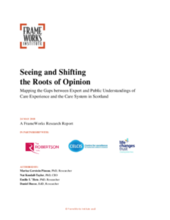Displaying 791 - 800 of 1177
This article from the BBC shares the findings of recent child protection inquiries, noting that the chances of a child being placed for adoption by the age of five "varies starkly by local authority."
This qualitative study examined disclosure for adult survivors of abandonment. Findings are centred around the experience of disclosure, the process of disclosure specifically exploring the role of half-truths and finally the impact of disclosure on the search for identity and self.
The objective of this study is to identify distinct patterns of care history by applying sequence analysis methods to longitudinal, administrative data.
This paper seeks to contribute to debates about how people's adult lives unfold after experiencing childhood adversity. It presents analysis from the British Chinese Adoption Study: a mixed methods follow-up study of women, now aged in their 40s and early 50s, who spent their infant lives in Hong Kong orphanages and were then adopted by families in the UK in the 1960s.
This comprehensive and authoritative book provides an accessible account of attachment concepts. It traces the pathways of secure and insecure patterns from birth to adulthood, exploring the impact of past experiences of abuse, neglect and separation on children’s behaviour in foster and adoptive families.
This study aims to confirm the proof of concept within foster carers and to explore the potential risks associated with intent to continue fostering, overall job satisfaction and psychological factors (avoidant coping) that could be targets for interventions.
"Thousands of 'pinball kids' are being shifted around the care system and between schools, putting them at risk of being excluded, groomed and recruited into gangs" in the UK, according to this article from the Guardian.
The number of people who have gone missing from residential care in London, UK rose 34% from 2013 to 2017, according to this article from BBC News.
This report charts public understandings of childhood, parenting and the care system, and examines how these ways of thinking complicate, and occasionally facilitate, communicating about care issues.
This article from the Guardian highlights findings from recent research which indicates the "children in care are six times more likely to be cautioned or convicted of a crime than other young people."

